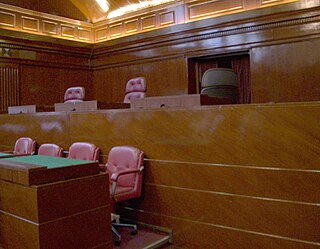Contempt of court, often referred to simply as "contempt", is the offense of being disobedient to or disrespectful toward a court of law and its officers in the form of behavior that opposes or defies the authority, justice, and dignity of the court. A similar attitude toward a legislative body is termed contempt of Parliament or contempt of Congress. The verb for "to commit contempt" is contemn and a person guilty of this is a contemnor.
A plaintiff is the party who initiates a lawsuit before a court. By doing so, the plaintiff seeks a legal remedy. If this search is successful, the court will issue judgment in favor of the plaintiff and make the appropriate court order. "Plaintiff" is the term used in civil cases in most English-speaking jurisdictions, the notable exception being England and Wales, where a plaintiff has, since the introduction of the Civil Procedure Rules in 1999, been known as a "claimant", but that term also has other meanings. In criminal cases, the prosecutor brings the case against the defendant, but the key complaining party is often called the "complainant".
Prima facie is a Latin expression meaning at first sight or based on first impression. The literal translation would be 'at first face' or 'at first appearance', from the feminine forms of primus ('first') and facies ('face'), both in the ablative case. In modern, colloquial and conversational English, a common translation would be "on the face of it".
A subpoena or witness summons is a writ issued by a government agency, most often a court, to compel testimony by a witness or production of evidence under a penalty for failure. There are two common types of subpoenas:
- subpoena ad testificandum orders a person to testify before the ordering authority or face punishment. The subpoena can also request the testimony to be given by phone or in person.
- subpoena duces tecum orders a person or organization to bring physical evidence before the ordering authority or face punishment. This is often used for requests to mail copies of documents to requesting party or directly to court.
An ex post facto law is a law that retroactively changes the legal consequences of actions that were committed, or relationships that existed, before the enactment of the law. In criminal law, it may criminalize actions that were legal when committed; it may aggravate a crime by bringing it into a more severe category than it was in when it was committed; it may change the punishment prescribed for a crime, as by adding new penalties or extending sentences; or it may alter the rules of evidence in order to make conviction for a crime likelier than it would have been when the deed was committed.
Contempt of Congress is the act of obstructing the work of the United States Congress or one of its committees. Historically, the bribery of a U.S. Senator or U.S. Representative was considered contempt of Congress. In modern times, contempt of Congress has generally applied to the refusal to comply with a subpoena issued by a congressional committee or subcommittee—usually seeking to compel either testimony or the production of requested documents.
In English and English-derived legal systems, an Anton Piller order is a court order that provides the right to search premises and seize evidence without prior warning. This is intended to prevent the destruction of relevant evidence, particularly in cases of alleged trademark, copyright or patent infringements.
In re Debs, 158 U.S. 564 (1895), was a US labor law case of the United States Supreme Court decision handed down concerning Eugene V. Debs and labor unions.
In countries with a parliamentary system of government, contempt of Parliament is the offence of obstructing the legislature in the carrying out of its functions, or of hindering any legislator in the performance of his duties.
A criminal charge is a formal accusation made by a governmental authority asserting that somebody has committed a crime. A charging document, which contains one or more criminal charges or counts, can take several forms, including:
A chargesheet is prepared after First Information Reports (FIRs), and charges an individual for the crimes specified in those FIR(s).

Grant Murray Snow is the Chief United States District Judge of the United States District Court for the District of Arizona.

In Singapore, the offence of scandalizing the court is committed when a person performs any act or publishes any writing that is calculated to bring a court or a judge of the court into contempt, or to lower his authority. An act or statement that alleges bias, lack of impartiality, impropriety or any wrongdoing concerning a judge in the exercise of his judicial function falls within the offence. The High Court and the Court of Appeal are empowered by section 7(1) of the Supreme Court of Judicature Act to punish for contempt of court. This provision is statutory recognition of the superior courts' inherent jurisdiction to uphold the proper administration of justice. The Subordinate Courts are also empowered by statute to punish acts of contempt. Although Article 14(1)(a) of the Constitution of the Republic of Singapore protects every citizen's right to freedom of speech and expression, the High Court has held that the offence of scandalizing the court falls within the category of exceptions from the right to free speech expressly stipulated in Article 14(2)(a). Some commentators have expressed the view that the courts have placed excessive value on protecting the independence of the judiciary, and have given insufficient weight to free speech.
Tampering with evidence, or evidence tampering, is an act in which a person alters, conceals, falsifies, or destroys evidence with the intent to interfere with an investigation (usually) by a law-enforcement, governmental, or regulatory authority. It is a criminal offense in many jurisdictions.

Stephen Christopher Yaxley-Lennon, better known as Tommy Robinson, is a British far-right, anti-Islam activist, and convicted criminal. He is the co-founder and former leader of the English Defence League, and later served as a political advisor to former UKIP leader Gerard Batten.

The basis of the Bahamian Law and legal system lies within the English Common Law tradition. Justices of the Supreme Court, Registrars and Magistrates are all appointed by The Governor-General acting on the advice of the Judicial and Legal Service Commission, which is composed of five individuals who are headed by the Chief Justice as their chairman. The Chief Justice and the Justices of the Court of Appeal, including the President, are appointed by the Governor-General on the recommendation of the Prime Minister after consultation with the Leader of the Opposition. Once appointed, the salaries and other terms of appointment of the Chief Justice, Justices of Appeal and Justices of the Supreme Court cannot be altered to their disadvantage. Justices of the Supreme Court can serve until the age of 65 years and, where agreed among the judge, the Prime Minister and the Leader of the Opposition, may serve until the age of 67. Justices of Appeal can serve until the age of 68 years and, where agreed among the judge, the Prime Minister and the Leader of the Opposition, may serve until the age of 70 years. The law of The Bahamas makes provisions for the appointment of 12 Justices to the Bench of the Supreme Court, inclusive of the Chief Justice, and for five Justices of the Court of Appeal, inclusive of the President. The Chief Justice, as Head of the Judiciary, is an ex officio member of the Court of Appeal, but only sits at the invitation of the President.
The Administration of Justice is the process by which the legal system of a government is executed. The presumed goal of such an administration is to provide justice for all those accessing the legal system. The phrase is also commonly used to describe a University degree, which can be a prerequisite for a job in law enforcement or government.

On August 25, 2017, President Donald Trump pardoned Joe Arpaio for criminal contempt of court, a misdemeanor. Arpaio had been convicted of the crime two months earlier for disobeying a federal judge's order to stop racial profiling in detaining "individuals suspected of being in the U.S. illegally". The pardon covered Arpaio's conviction and "any other offenses under Chapter 21 of Title 18, United States Code that might arise, or be charged, in connection with Melendres v. Arpaio." The official White House statement announcing the grant of clemency described Arpaio as a "worthy candidate" having served the nation for more than fifty years "protecting the public from the scourges of crime and illegal immigration."
Linwood v Andrews (1888) is a land mark case in English Law and a Common law precedent regarding making misleading submissions to a court.
In India, the offence of contempt of court is committed when a person either disobeys a court order, or when a person says or does anything that scandalizes, prejudices, or interferes with judicial proceedings and the administration of justice. Contempt of court can be punished with imprisonment or a fine, or both.




